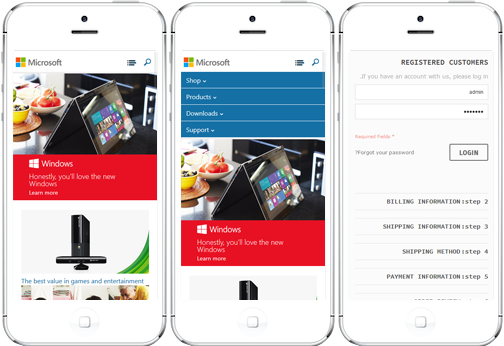The Rise of Low-Code Platforms in Mobile App Development
When you are creating a mobile app, you will need to plan, design, develop, and launch it, which can be a time-consuming process. However, when you use a low-code platform to create mobile apps, you save time and money along the way.
That is why low-code platforms have recently become the focus of more businesses, citizen developers, and startups. It is stated that the market size of the low-code development industry will escalate by 32.2 percent at a CAGR that will lead to an overall market of 264.40 billion by 2032. Nevertheless, the choice of a low-code development platform is a significant problem faced by the majority of businesses and startups.
Does an organization waste its time making such an investment? Will it give what business needs? This article offers all the answers you need if you are a business, startup, or citizen developer looking for low-code platforms to build mobile apps. It covers everything from what low-code platforms are, their features, reasons to choose one, and top options. So, let’s get started.
What Are Low-Code Platforms?
Low-code platforms are visual software development environments that allow citizen developers to build applications using drag-and-drop tools. These drag and drop mobile app builders have pre-built components and configurations. So if you are a startup owner or entrepreneur looking for rapid mobile app development, low-code platforms make sense.
Leveraging low-code mobile app development, you can reduce the need for specialized programming skills. It eliminates the significant investment needed to build applications and also improves the time to market. This is unlike the conventional approach of hiring developers and investing considerable time in development.
For business needs that require even more sophisticated functions or have a long-term plans on scaling up, working with professionals through mobile app development services assures that low-code solutions are aligned with enterprise-grade standards and support future growth.
So, how does low-code mobile app development differ from a traditional approach?
Apart from the reduced time and effort, there are many other aspects that distinguish the low-code mobile app development from the conventional one. For example, a low-code platform for mobile apps abstracts much of the coding part. Developers just have to drag-and-drop elements which they want to use to build an app faster.
The traditional approach requires coding individual components and then combining them to build a centralized app codebase. Here are some key differences.
| Differentiator | Low‑Code Platforms | Traditional Development |
| Approach | Visual modeling with configuration | Hand-coded using programming languages and frameworks |
| Speed | Faster delivery via reusable components and automation | Slower due to custom coding and environment setup |
| Skills | Mixed teams; business technologists can contribute under IT governance | Primarily professional developers with deep technical expertise, knowledge of algorithms, and software architecture. |
| Customization | Limited by platform abstractions; some extensibility | Full control over architecture, code, and performance tuning |
| Cost | Lower build effort, but subscription and vendor dependency | Higher initial effort; full ownership and no vendor lock-in |
| Support and maintenance | Doesn’t require any monitoring because of automatic updates from the platforms, which also reduce maintenance. | Needs updates and maintenance from a dedicated development team. |
Common Features Of Low-Code Platforms
Here are the key features that you can leverage for your application development projects.
-
Visual Tools
Visual interface with drag and drop attributes, along with form designers and model-driven editors, allows you to design data models, pages, and logic without coding. Plus, it also offers visual debugging and validation features to detect errors early.
-
Reusable Components
Such platforms are also one of best cross-platform app building tools that can be used because of pre-built UI widgets, templates, data models, and logic blocks. These are reusable components across platforms, and hence, consistency is provided and development is faster.
-
Workflow Automation
Choosing the best low-code mobile app development platform will help you get visual orchestration tools. It defines processes, approvals, and business rules with customized logic. Plus, you will also get built-in schedulers, custom notifications, and event handlers that streamline routine tasks, reducing manual development efforts.
-
API/Database Integration
You also receive API connectors, which enable you to join enterprise systems by using their mobile application builder, which comes with drag-and-drop functionality. This incorporates REST/SOAP adapters, webhooks, and support of OData/GraphQL, making it possible to make custom integrations.
-
Cross-platform deployment
Low-code platforms have cross-platform compatibility for mobile app development. It lets you create apps once and deploy to iOS and Android devices. This means that it does not require the development and maintenance of unique codebases on each platform, significantly reducing the time it takes to create and support a product, and ensuring unified user experiences across devices.
Why Mobile App Development Is Embracing Low-Code?
Citizen developers, startup owners, and entrepreneurs are now leveraging no code platforms to optimize development time and cost. Such platforms help improve agility and technical capabilities for non-technical users.
Here are some of the key reasons:
-
Speed to market
Low-code platforms enable you to build apps in no time. Comparing it to the traditional development approach, low-code development platforms seem to be an attractive choice. Conventional coding can take up to months, sometimes based on development requirements. However, with low-code platforms, it’s a matter of hours or weeks.
-
Cost savings
Using a low-code platform for mobile app development can help you reduce the cost substantially. Firstly, a low-code platform can help reduce the cost of coding, and even if you want to customize app features, it does not require extensive efforts.
Because the base code is already present through code blocks pre-built in the low-code platform elements. You can use these elements and visual development tools for rapid development at low cost.
-
Accessibility for Non-Developers
These platforms can help you build functional app prototypes. It is especially important for citizen developers looking to validate their ideas. Startup owners with limited budgets can leverage such platforms to create prototypes for an investor’s pitch easily.
-
Scalability & automation
Modern platforms come with advanced features like built-in workflow orchestration, AI-assisted development, and event-driven automation. It allows you to scale the apps as the user base grows easily.
So, who are these low-code platforms for?
Who Benefits from Low-Code Mobile Development?
A low-code development approach is not for everyone. A lot of the decision creep sets in, especially for the enterprise use cases. However, if you are one of the following people, low-code platforms make more sense,
- Startups can prototype mobile apps by using the low-code platforms and test their ideas quickly. A low-code platform is the optimal choice, especially when a startup wants to pivot fast.
- Citizen developers and business users who lack coding skills can also use these platforms to construct prototype applications.
- Business professionals can leverage it to scale IT workflows, leveraging low-code platforms.
- Enterprises can leverage such platforms to reduce backlogs and collaborate with other business units effectively.
At FTI Tech, we have experience creating mobile app development solutions for businesses of all sizes and industries to achieve efficient user experiences, operational efficiency, and results-driven outcomes.
Now that you know what low-code platforms are, their features, and why you need them, here are some of the best platforms you can choose from.
Best Low-Code Mobile App Development Platforms
Some of the best platforms you can choose for your mobile app development projects are,
-
Bubble
Bubble is one of the most advanced low-code platforms available. It offers visual development tools allowing you to create apps easily. This platform offers advanced database management capabilities, advanced workflow automation, and an entire ecosystem of plugins.
- Best for startups looking to validate ideas fast.
- Pricing- Tiered subscriptions that scale as per usage and features.
-
FlutterFlow
FlutterFlow allows you to generate Flutter code quickly without extensive coding knowledge. It offers enhanced native performance for your apps with strong UI control and is a Firebase-friendly platform.
- Best for teams wanting a native feel/performance and optional code export.
- Pricing- Tiered subscriptions with higher prices for advanced features.
-
OutSystems
OutSystems comes with inherent data governance, integrations, DevOps, and scalability attributes for low-code development. It is also AI-driven and provides full-stack development capability. What this means is that even large organizations looking for robust mobile app development can use low-code platforms at scale.
- Best for large organizations looking to build mission-critical apps.
- Pricing- Enterprise licensing fees higher than other platforms.
-
Microsoft Power Apps
If your organization is looking for a low-code platform for mobile app development within the Microsoft ecosystem, this is the best option. Microsoft Power Apps comes with deep integration of Microsoft 365, Dataverse, Dynamics, and Azure.
- Best for organizations already on the Microsoft stack and seeking quick mobile solutions.
- Pricing- Pay-per-use model is favourable for MS-centric environments.
While these platforms provide a solid starting point, businesses often need expert support to customize, integrate, and scale their applications. FTI Tech specializes in taking low-code apps beyond the basics and aligning them with enterprise workflows to guarantee performance and create solutions that scale as your business grows.
Conclusion
Low-code platforms are becoming the new norm for mobile app development projects. Startups, citizen developers, and even enterprises are now looking to rapidly test their ideas using low-code platforms for mobile app development. What makes these platforms attractive is minimal effort, non-technical experience requirements, and ease of use of visual tools. From workflow automation to idea validation and prototyping internal apps these platforms allow you to build, test and improve applications quickly.
So, if you are looking to enter a market at rapid pace, low-code development approach is what you need to embrace. Contact us to find out how we can help you in your mobile app development.



